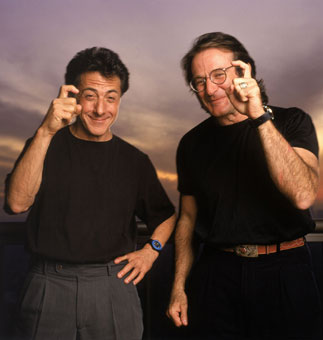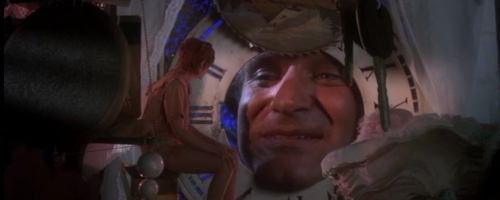
As suggested in previous articles, I’d encourage you to pull up the film’s soundtrack on Spotify and listen while you read. Listen especially to the song entitled Remembering Childhood. It’s okay to cry.
 There is a temptation, encased in sincere sentiment, to claim the work of Robin Williams for the sake of my generation. The kid film portfolio of the 1990’s, a ray of sunshine in film history that Williams often basked in, mentored me, and taught me that it was not only possible but probable for comedy and drama and pain and suffering to gracefully coexist (I wrote about this briefly in my article on Punch Drunk Love). But for any generation to claim Williams as their own would be to selfishly misunderstand the full barrier pummeling capacity of his works, especially that which was directed towards the family film genre.
There is a temptation, encased in sincere sentiment, to claim the work of Robin Williams for the sake of my generation. The kid film portfolio of the 1990’s, a ray of sunshine in film history that Williams often basked in, mentored me, and taught me that it was not only possible but probable for comedy and drama and pain and suffering to gracefully coexist (I wrote about this briefly in my article on Punch Drunk Love). But for any generation to claim Williams as their own would be to selfishly misunderstand the full barrier pummeling capacity of his works, especially that which was directed towards the family film genre.
A scene from Williams’ 1991 rendition of the classic Peter Pan story, Hook, arguably one of Williams’ most beloved performances, came to mind. In said scene a middle-aged Peter Banning, played by Williams, has, with great resistance, finally rediscovered the happy thoughts which morph him back into the flying, ravaging Lost Boy he once was, Peter Pan. Pan’s youthful exuberance nearly frees his mind from any reminding inclinations of why he ventured back to Neverland in the first place, after decades of attempting to forget it: to rescue his kidnapped children from the abdominal Captain Hook. Wanting to boast of his transformation, he searches for his beloved guide, his conscience, Tinker Bell. Tink is taking refuge in her home, a grandfather clock (an ironic shelter considering that time is the bane of the existence for all who dwell in Neverland).
Tink, you in there?
Pan asks, approaching the clock. The clock face opens revealing a pouting Tinker bell.
Are you sad?!
Pan is appalled by the thought of an jubilant-less Tinker Bell!
No, now please go away!
Tink responds with sniffles and tears. She knows that Peter’s transformation from Banning to Pan also means that he will soon leave Neverland once again.
Oh! You’re sick!
Peter, now fully aware of Tink’s dampened spirits, singles in on Tink’s sickness, physical and emotional, and forces his head into the small hole of the clock face. After hurling a few laughless jokes at her, he cracks a goofy, yet concerned smile. This was not a Peter Pan smile, nor was it a Peter Banning smile. It was a Robin Williams Smile. This is the image that I will choose to remember Mr. Williams by: his squished face, inside a grandfather clock, pouring out buckets of love upon a heartbroken friend with a smile.

Williams was a goofball, yes, but he was goofball all too aware of the sick and broken state of the world; a goofball who melted down his own experiences while navigating through life’s valleys and purposefully injected his own serum, with the thin needle of fabricated worlds, into his audience’s real world. With great appreciation, Williams was careful to never dismiss any of the real world’s wreckage. In saturating his characters with that awareness, Williams allowed the public to see performances that dripped with darkness, but somehow still activated ebullient, uncontainable smiles.
Think back on a few of the characters he played: Jumanji: a boy who was abducted into a heinous world, where
everything that moved sought to kill him, makes it out alive decades later only to find out he cannot proceed in life until he sincerely confronts the demons of his past. Mrs. Doubtfire: A man who has so unabashedly abandoned his wife in nearly all of his husbandry duties that he believes he must recreate his entire identity in order to win his family back. The Dead Poets Society: A prep school professor with an unorthodox teaching style, who sought to enlighten his students on the technicality subtracted, unashamed beauty of human passion, is obliged to deal with the suicide of his most prized pupil because of the influence of his culture. And Hook: A man who had, with all of his might and will, done everything he could to forget what had molded him into the person that he had become, and to come to this realization he must experience the abduction of his children; a nightmarish tragedy that haunts every parent. Even though Williams may not have written these scripts, he, without a doubt, fulfilled their roles with his own genuine character.
I never had to justify the mourning of Robin Williams’ life, even in the wake of other “heavier” tragedies. I’m sure you know that. But if I did, if I did have to justify it, I could. Robin new this world was dark, he just wanted to be a candle. When I realize this, my head hangs low, and my eyes well up. I wish he had found relief to that weight. I am thankful, though, that there is a Candle that exists, bright enough to reveal a path.
In loving memory…
[youtube http://www.youtube.com/watch?v=jiyIcz7wUH0&w=560&h=315]

COMMENTS
Leave a Reply












